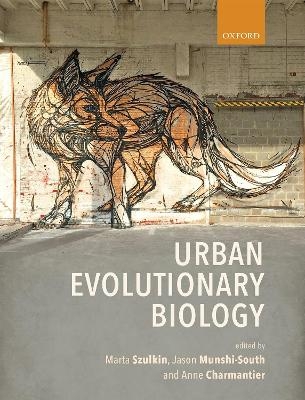
Urban Evolutionary Biology
Oxford University Press (Verlag)
978-0-19-883685-8 (ISBN)
We are presently witnessing the emergence of a new field of research in evolutionary biology. Despite its rapid global expansion, the urban environment has until now been a largely neglected study site among evolutionary biologists. With its conspicuously altered ecological dynamics, it stands in stark contrast to the natural environments traditionally used as cornerstones for evolutionary ecology research.
Urbanization can offer a great range of new opportunities to test for rapid evolutionary processes as a consequence of human activity, both because of replicate contexts for hypothesis testing, but also because cities are characterized by an array of easily quantifiable environmental axes of variation and thus testable agents of selection. Thanks to a wide possible breadth of inference (in terms of taxa) that may be studied, and a great variety of analytical methods, urban evolution has the potential to stand at a fascinating multi-disciplinary crossroad, enriching the field of evolutionary biology with emergent yet incredibly potent new research themes where the urban habitat is key.
Urban Evolutionary Biology is an advanced textbook suitable for graduate level students as well as professional researchers studying the genetics, evolutionary biology, and ecology of urban environments. It is also highly relevant to urban ecologists and urban wildlife practitioners.
Marta Szulkin is an evolutionary biologist who completed her first degree at the University of Warsaw, Poland. She holds a Masters and a Doctoral degree in evolutionary biology from the University of Oxford (UK). Marta was as Magdalen College Research Fellow (University of Oxford), and a Marie Curie Fellow at CEFE CNRS in Montpellier (France). She is currently associate professor at the Centre of New Technologies, University of Warsaw (Poland), where she is heading the Wild Urban Evolution & Ecology Lab. She is managing a prospectively long-term study of urban passerines in Warsaw, and is interested in the evolution and ecology of all urban life. Jason Munshi-South is an evolutionary ecologist that completed a Ph.D. at the University of Maryland, USA, and a postdoctoral position at the Smithsonian Institution. He is currently a Professor of Biological Sciences at Fordham University in Bronx, NY, USA. His main research interests are the ecology and evolution of urban wildlife, with special emphasis on the landscape genomics of urban rodents. Anne Charmantier is an evolutionary ecologist educated in France, the UK and Canada, and presently holding a senior permanent CNRS position. Her main research interests are focused on understanding the mechanisms involved in the evolution of adaptive traits, especially in a context of rapid anthropogenic changes. Since 2007, she is managing a long-term blue tit project, which contributes to her research on local adaptation, plasticity, senescence, ecological genomics and sexual selection. She has particularly pioneered quantitative genetic approaches in wild populations, to study adaptive and non-adaptive responses to climate change and urbanisation.
Marina Alberti: Foreword
1: Marta Szulkin, Jason Munshi-South and Anne Charmantier: Introduction
2: Marta Szulkin, Colin J. Garroway, Michela Corsini, Andrzej Z. Kotarba and Davide Dominoni: How to quantify urbanisation when testing for urban evolution
3: James S. Santangelo, Lindsay S. Miles, Sophie T. Breitbart, David Murray-Stoker, L. Ruth Rivkin, Marc T. J. Johnson and Rob W. Ness: Urban environments as a framework to study parallel evolution
4: Jason Munshi-South and Jonathan L. Richardson: Landscape genetic approaches to understanding movement and gene flow in cities
5: Charles Perrier, Aude Caizergues and Anne Charmantier: Adaptation genomics in urban environments
6: Sarah E. Diamond and Ryan A. Martin: Evolutionary consequences of the urban heat island
7: Rebecca E. Irwin, Elsa Youngsteadt, Paige S. Warren and Judith L. Bronstein: The evolutionary ecology of mutualisms in urban landscapes
8: P.O. Cheptou and S. Lambrecht: Sidewalk plants as a model for studying adaptation to urban environments
9: Amanda J. Gorton, Liana T. Burghardt and Peter Tiffin: Adaptive evolution of plant life history in urban environments
10: R. Brian Langerhans and Elizabeth M.A. Kern: Urbanization and evolution in aquatic environments
11: Kristien I. Brans, Lynn Govaert and Luc De Meester: Evolutionary dynamics of metacommunities in urbanized landscapes
12: Kristin M. Winchell, Andrew C. Battles, Talia Y. Moore: Terrestrial locomotor evolution in urban environments
13: Caroline Isaksson and Frances Bonier: Urban evolutionary physiology
14: Tuul Sepp, Kevin J. McGraw and Mathieu Giraudeau: Urban sexual selection
15: Daniel Sol, Oriol Lapiedra, and Simon Ducatez: Cognition and adaptation to urban environments
16: Emmanuel Milot and Stephen C. Stearns: Selection on humans in cities
| Erscheinungsdatum | 16.07.2020 |
|---|---|
| Verlagsort | Oxford |
| Sprache | englisch |
| Maße | 187 x 255 mm |
| Gewicht | 648 g |
| Themenwelt | Naturwissenschaften ► Biologie ► Evolution |
| Naturwissenschaften ► Biologie ► Genetik / Molekularbiologie | |
| Naturwissenschaften ► Biologie ► Zoologie | |
| ISBN-10 | 0-19-883685-6 / 0198836856 |
| ISBN-13 | 978-0-19-883685-8 / 9780198836858 |
| Zustand | Neuware |
| Informationen gemäß Produktsicherheitsverordnung (GPSR) | |
| Haben Sie eine Frage zum Produkt? |
aus dem Bereich


